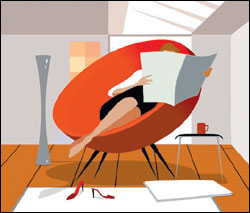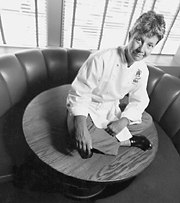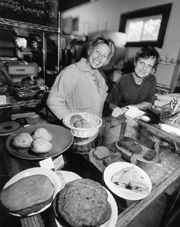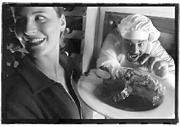Having bowed out of one world to have a baby in 1998, I’m now back and somewhat startled to find that I and my urp-stained confreres have become the toast of the literary world. It’s a strange feeling, to emerge from the mommy cave and discover that all this time you’ve been wiping snot and chiseling petrified Cheerios off the bottom of your handbag, you’re suddenly the Holy Grail for New York publishers.
What they’re selling, of course, is “chick lit,” which many trace to the 1996 publication of Bridget Jones’s Diary, Helen Fielding’s acerbic chronicle of the comic obsessions of a British career girl looking for lasting love and a smaller bum, not necessarily in that order.
That book inspired a slew of knockoffs, an
inordinate number of them from British authors, characterized in the main by loopy female protagonists, first-person narration, self-effacing comedy, and story lines marked by longing, usually for the perfect man. These books have inspired hissing disdain from an intelligentsia scornful of the superficial, pre-feminist obsessions of the heroines, “these helpless girls,” sputtered Doris Lessing in a 2001 BBC radio interview, “drunken, worrying about their weight.”
But I disagree. After surveying several recent titles (not the cream of the crop, not the Bushnell bottom of the barrel, either, but a current sample of the genre), I’ve come to a different conclusion: Chick lit should be respected not because it sells; rather, chick lit sells because it respects its readers and their ordinary lives.
FOR INSTANCE, in the first novel by short-story luminary Julie Hecht, The Unprofessionals (Random House, $23.95, September), the author reveals in finely engraved detail a middle-aged female narrator who’s caught up in a contemporary culture that bewilders, disappoints, and enslaves her. You find yourself trudging along on her long, minutely observed, funny-sad quest for insoles at the drugstore with Hecht’s neurotic heroine. It’s a scene that displays the paucity of American culture even as it reveals the vacancy of the protagonist’s soul. Indeed, the more cultural detail there is, the emptier our heroine’s life appears. It’s all in the details.
In Brick Lane (Scribner, $24, September), the much- heralded debut novel from toast-of-Granta Monica Ali, you find yourself tracing the poignant path to self- actualization of a Bangladeshi woman in London. It’s a long, slow road out of her famine-beset village, and the reader is with Nazneen every step of the waystanding wearily at the kitchen sink at midnight eating curry out of a Tupperware container, gossiping with a girlfriend about the characters who populate their constricted immigrant’s world. Lane is a novel in which the life-changing action turns on the dailiest events, much as in life. A marriage is pledged; a baby is born. Change happens imperceptibly, the way it does in life, as women stand at the kitchen sink, eating curry out of Tupperware. By the end of the book, Nazneen is suddenly her own woman, and you wonder how it happened. It happened in the details.
In What Was She Thinking? (Notes on a Scandal) (Henry Holt, $23, August), Zo레eller hauntingly portrays a female teacher sexually obsessed with a 15-year-old boyand the aging spinster who is obsessed with her. That spinster is the novel’s narrator, the deeply unhinged Barbara, who obsesses over what to wear to dinner at the teacher’s house, what to say in social situations, how to conduct herself on a date. More than the above two titles, Scandal is a novel lived in its smallest moments, for it’s those moments that finally reveal Barbara for what she is. The teacher may be the Mary Kay LeTourneau of the tale, who does the monstrous deedbut it’s Barbara, whose life is gradually, masterfully revealed to hold no life at all, who is the monster.
Anyone familiar with Jane Austen’s oeuvre will immediately recognize in chick lit a kindred wit, the same obsession with choosing a mate, and a shared attention to the dailiness of women’s lives. Recall how Elizabeth Bennet had to spend much of her days writing letters, worrying about money, and minding her sisternot exactly the glamorous life.
DOES THAT MAKE chick lit damningly pre-feminist? Far from itthese depictions honor womens’ lives by illuminating them the way they are really lived. In these books, it’s the mundane concerns of a woman’s lifeher search for the right orthotics; her passion for her children; and, yes, her anxiety about the size of her bumthat get the lion’s share of attention; and they shine the brightest light on the honest circumstances of her existence.
This is why Allison Pearson’s 2002 I Don’t Know How She Does It (Knopf, $13.95, new in paper) has become such a sales phenomenon. Its mordant expos頯f the real lives of working mothers fits snugly into the narrowest, most objectionable possible definition of chick lit, like Bridget Jones: The Nappy Years. Yet it shimmers with an enlightenment much greater than the sum of its deftly scripted, politically incorrect, and hugely entertaining parts. (“Terrific start to the day. Smear test. Like having sex with the Tin Man. Can’t they make that damn probe out of rubber, or would they just get sad women like me queuing up to have it done twice a week?”)
What woman hasn’t felt demeaned by the smear test? What woman hasn’t wasted vital time reflecting on the size of her bum? (If Lessing never has, then she’s without question the only such woman on the planet.) In a world in which fiction by and about men has forever enjoyed the unqualified honorific of literature, fiction by and about women is at last coming into a spotlight of its own (albeit with a cheesy, market-driven stage name). It’s about time.
There’s even a Web site (www.chicklit.us) that grandly elevates the genre above simple romance novels: “Gone are the exotic locations and the dashing but brooding tycoon that whisks the ever-so-genteel heroine into the sunset. The location is . . . a shared flat outside of London with real, true-to-life characters and loads of boyfriend angst.” No, one imagines, not exactly Lessing’s cuppa. But if she were alive today, I suspect that Jane Austen might live like that. Writing today, her characters might even resemble our own.








